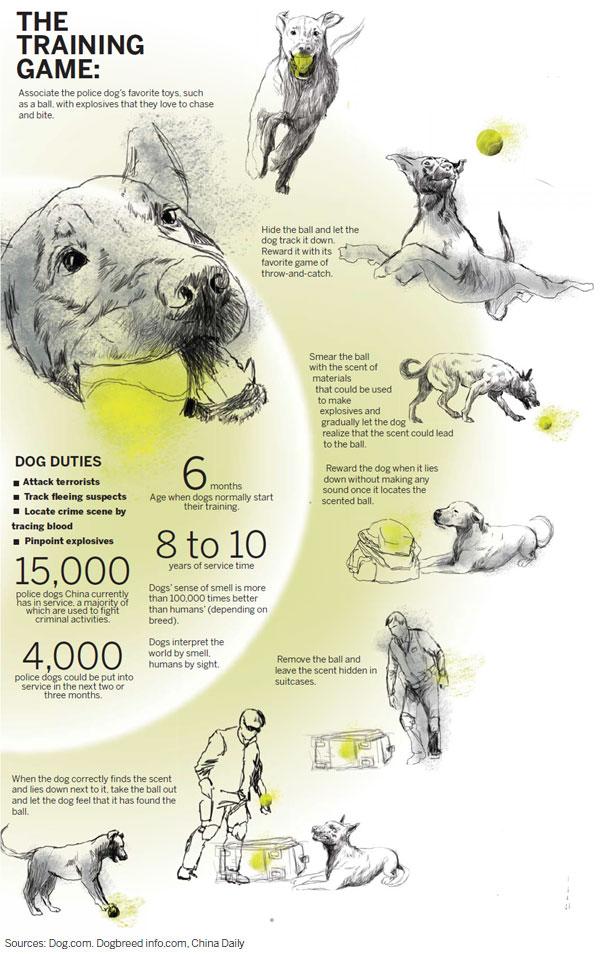

Trainer Zheng Nan works with police dog Defu in Urumqi, capital of the Xinjiang Uygur autonomous region. Police dogs are being used to combat terrorism in the region. Chen Feng / For China Daily
The work is not for the faint-hearted.
Spotting a target 50 meters away, Defu locked his eyes on the figure. He bared his teeth and growled. Crouching low, he waited patiently for his prey.
"Xi! (attack)," shouted Defu's partner, who was next to him.
Hearing the one-word command, Defu charged toward his quarry, his jaws clamping down on an arm with terrifying force and his teeth tearing the limb to pieces.
When he had finished, the dummy "terrorist" figure lay in shreds. A human would have met a similar fate.
Defu, a 4-year-old Rottweiler and Doberman crossbreed, is a police dog in Urumqi, capital of the Xinjiang Uygur autonomous region.
Liu Xin, a special police officer, has been training the animal for two and a half years. They are part of the Urumqi special police force No 8 detachment's police dog unit.
"In Xinjiang, these are the dogs that fight terrorism. Imagine that was a terrorist's arm. Defu is trained not to let the target go until injury is inflicted," Liu, 26, said.
The unit's other dogs had already bitten off the dummy terrorist's face during their training.
"He is a happy dog as long as I am at his side, even when we are assigned to missions like arresting terrorist suspects or detecting explosives, which can be dangerous and life-threatening to both of us," Liu said.
On May 22, two dogs and their special police handlers from Liu's unit were immediately sent to the bloody scene of a terrorist attack in the regional capital. Thirty-nine people were killed in the attack. The dogs searched for possible remaining explosives and cleared the path for rescue and investigation teams.
The burnt wreckage of the two jeeps used by terrorists to ram into civilians in a morning market on that day are still stored next to the dogs' kennels, reminding people not to forget the efforts of the canine unit.
The dogs have proved themselves a reliable and fearless force in Xinjiang, which is the main battleground of China's war against terrorism as an increasing number of terrorist attacks have occurred in the region.
In a case last year, police dogs were used to hunt fleeing terrorist suspects in southern Xinjiang's Kashgar prefecture. A dog spotted a cornered suspect who attempted to attack the police officers. The dog alerted the team as it pounced on the suspect and prevented police casualties.
Another dog from southern Xinjiang's Hotan prefecture found more than 70 explosives at a house used by a terrorist cell this year.
In the search of a terrorist suspect's house in Urumqi earlier this year, Defu also accurately located hidden explosives, Liu said with pride.
"We respect our partners. That's why we always refer to them as 'canines' instead of 'dogs' because they have important and irreplaceable professions."
Born fighters
The canine force in the special police's No 8 detachment doubled to 80 in August because its presence in counterterrorism missions is in high demand.
Temporary kennels have been built to accommodate the newcomers flown in from Nanchang, capital of Jiangxi province, where one of the four canine centers operated by the Ministry of Public Security is based.
Each police dog has a unique serial number burnt onto a small electronic chip implanted in its neck. They are classified as police inventories. For a canine officer, losing a dog by accident is as serious as losing a gun.
"Most of our partners are wolf dogs, which are born attackers. Also, they need to be able to use their extraordinary sense of smell - up to 100,000 times more accurate than a human's - to detect explosives that are commonly used in Xinjiang's terrorist attacks," said Ma Tao, deputy director of the canine force.
The force's dogs often fight alongside the Flying Tiger Squad, Urumqi's elite special police team. During combat, the dogs are often the first to go into the rooms where terrorist suspects are hiding to launch the first round of attack to buy valuable time for Flying Tiger members to strike and reduce human casualties, Ma said.
"Real counterterrorism combat requires our canines not to be afraid of gunfire and stun grenades. Our regular training also includes firing weapons near them so that they can get used to the loud sounds and the smell," Ma said while walking Souka, the 7-year-old Malinois dog, to the shooting range.
Ma has been training Souka for six and a half years, which has created a tacit understanding between the pair.
"It might sound unbelievable, but Souka sometimes senses what I want him to do with just one look," Ma said.
He pulled the trigger on his machine gun and fired the rounds right in front of the veteran police dog. The gunfire did not seem to affect Souka.
"He is fearless because he wants to protect me with his life," Ma said.

Copyright ©1999-2018
Chinanews.com. All rights reserved.
Reproduction in whole or in part without permission is prohibited.